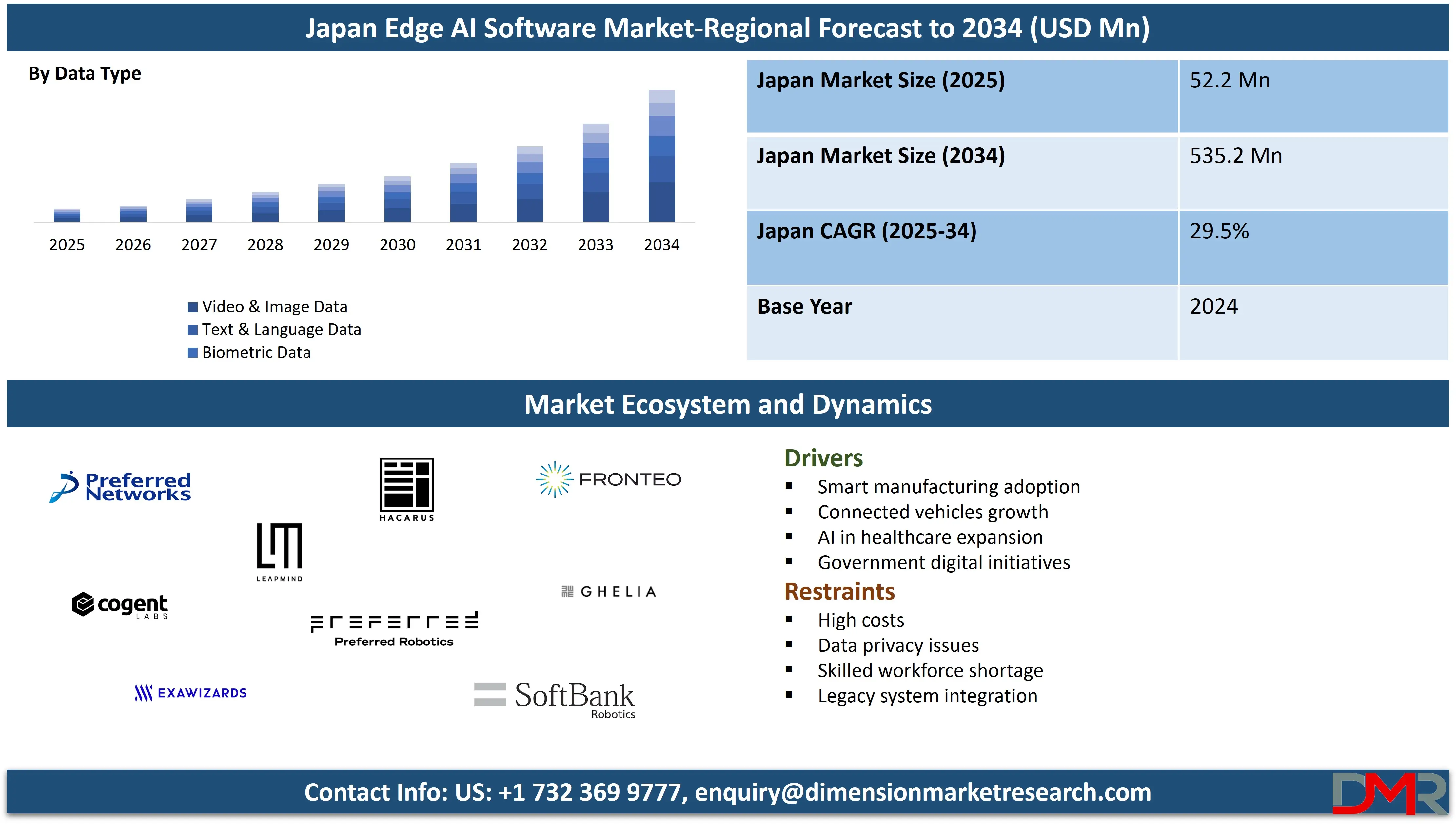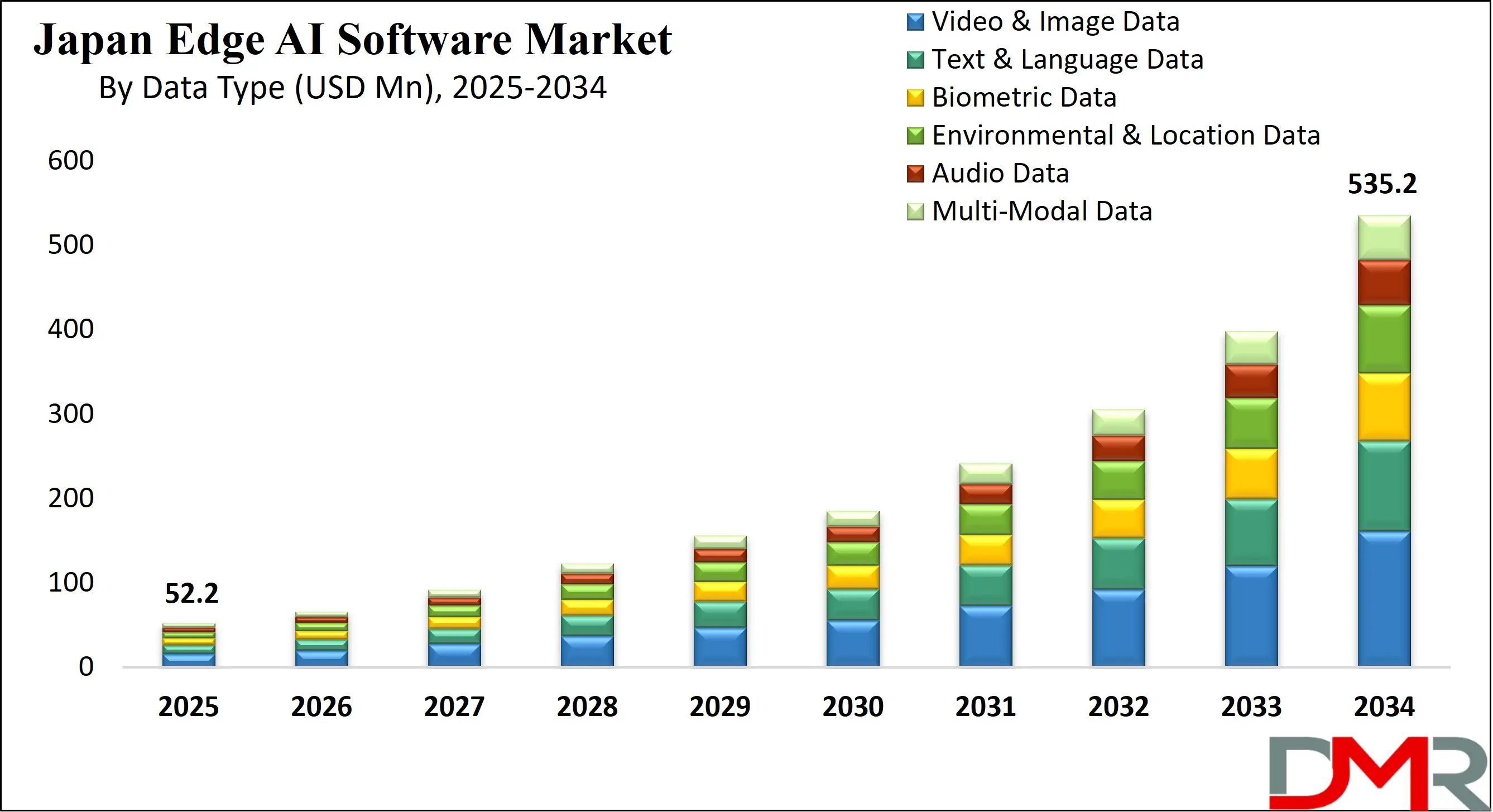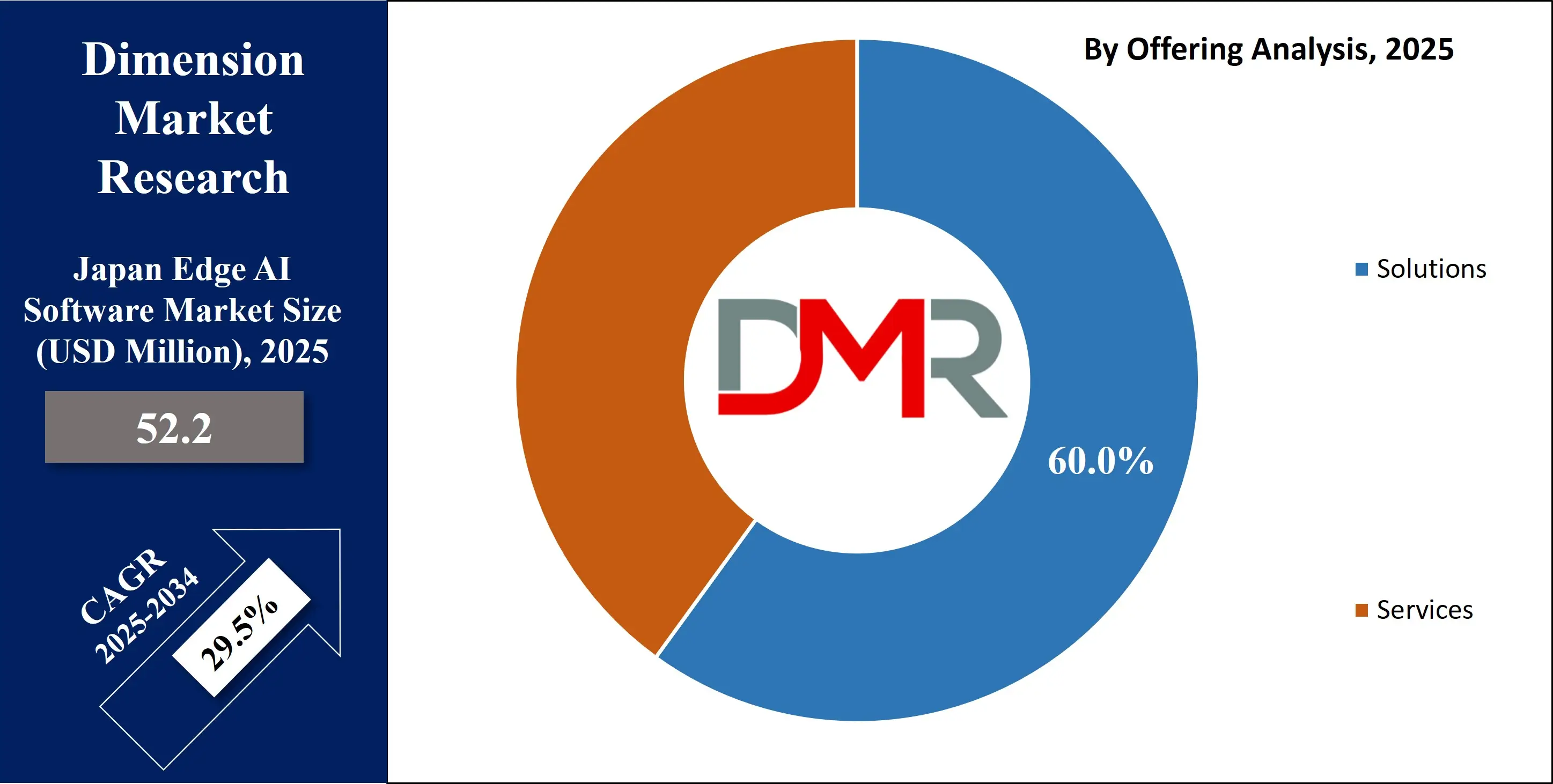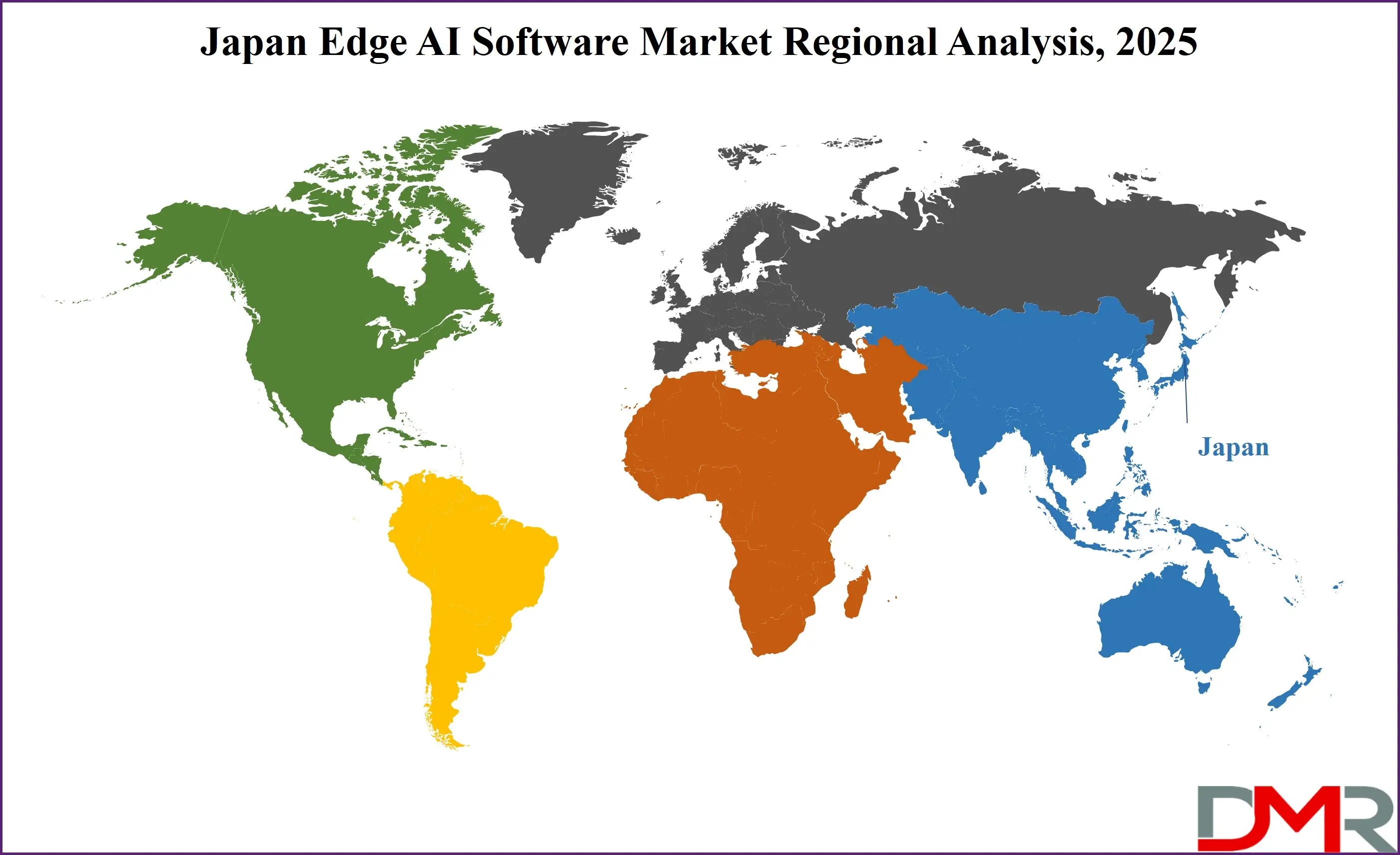Market Overview
Japan’s edge AI software market is projected to reach USD 52.2 million in 2025 and is expected to expand significantly, hitting USD 535.2 million by 2034, registering a strong CAGR of 29.5%. The growth is driven by rising adoption of real-time analytics, smart manufacturing, connected vehicles, IoT applications, and AI-powered automation across industries, positioning Japan as a leading hub for intelligent edge computing in the Asia Pacific region.

ℹ
To learn more about this report –
Download Your Free Sample Report Here
Edge AI software refers to intelligent applications and frameworks that bring artificial intelligence processing closer to the source of data rather than relying solely on centralized cloud infrastructure. It enables real time decision making on devices such as sensors, cameras, robots, smartphones and IoT systems by analyzing audio, video, text, biometric and environmental information directly at the edge. This reduces latency, strengthens data privacy, lowers bandwidth consumption and improves efficiency in mission critical tasks like predictive maintenance, autonomous driving, healthcare monitoring, and industrial automation. By combining machine learning models with edge computing, edge AI software is transforming how industries process information, enabling faster insights and localized intelligence across diverse sectors.
The Japan edge AI software market is evolving rapidly as industries such as manufacturing, automotive, healthcare and telecommunications embrace intelligent edge based applications. With Japan’s strong foundation in robotics, advanced electronics and industrial automation, the adoption of AI driven edge solutions is becoming a key enabler for smart factories, real time quality control and autonomous systems. Edge AI platforms are being integrated into enterprise workflows to process complex data streams locally, thereby reducing reliance on external data centers while addressing the growing demand for security, speed and operational efficiency. The government’s push toward Society 5.0 and digital transformation further accelerates investment in AI tools that can run seamlessly on edge devices across smart cities and public infrastructure.

ℹ
To learn more about this report –
Download Your Free Sample Report Here
The growing need for low latency computing, integrated with the country’s emphasis on innovation in areas like connected vehicles, smart healthcare systems and next generation communication networks, is fueling market growth. Japanese startups and established technology leaders are developing specialized edge AI solutions tailored for high performance and lightweight applications, making the software ecosystem highly dynamic. The market outlook remains promising as enterprises shift towards localized AI models capable of handling multimodal data inputs, enabling predictive analytics, and improving customer experiences. As a result, Japan is positioning itself as one of the leading hubs for edge AI software development and deployment in the Asia Pacific region.
Japan Edge AI Software Market: Key Takeaways
- Market Value: The Japan Edge AI Software market size is expected to reach a value of USD 535.2 million by 2034 from a base value of USD 52.2 million in 2025 at a CAGR of 29.5%.
- By Offering Segment Analysis: Solutions are anticipated to dominate the offering segment, capturing 60.0% of the total market share in 2025.
- By Data Type Segment Analysis: Video & Image Data is expected to maintain its dominance in the data type segment, capturing 30.0% of the total market share in 2025.
- By End-User Segment Analysis: Manufacturing users are expected to consolidate their dominance in the end-user segment, capturing 25.0% of the market share in 2025.
- Key Players: Some key players in the Japan Edge AI Software market are Preferred Networks, ABEJA, LeapMind, Cogent Labs, ExaWizards, Hacarus, Preferred Robotics, FRONTEO, Ghelia, SoftBank Robotics, Mujin, Ubie, Cinnamon, AI Medical Service, and Others.
Japan Edge AI Software Market: Use Cases
- Smart Manufacturing and Industrial Automation: Japan’s strong manufacturing base is leveraging edge AI software to drive smart factory initiatives. By deploying AI models directly on production lines, companies can perform real time quality inspection, predictive maintenance, and anomaly detection without relying on cloud latency. Edge AI enhances robotics performance, streamlines workflows, and improves yield rates, aligning with the nation’s Industry 4.0 and Society 5.0 goals.
- Connected and Autonomous Vehicles: The automotive sector in Japan is adopting edge AI software to support self driving capabilities, driver assistance systems, and vehicle to infrastructure communication. Processing video, image, and sensor data at the edge enables ultra low latency decision making crucial for road safety. Automotive leaders are integrating edge AI into EV platforms, traffic management, and logistics optimization to strengthen Japan’s global leadership in mobility innovation.
- Healthcare Diagnostics and Patient Monitoring: Hospitals and startups in Japan are deploying edge AI solutions for diagnostic imaging, biometric data analysis, and continuous patient monitoring. By processing sensitive medical data locally, edge AI ensures privacy compliance while enabling faster detection of conditions like cancer, cardiovascular issues, and neurological disorders. Wearable devices and AI powered medical imaging tools are enhancing personalized healthcare delivery in the country.
- Smart Cities and Public Infrastructure: Japan’s government and municipalities are applying edge AI in smart city initiatives, including surveillance, traffic flow management, disaster detection, and energy efficiency. By analyzing multimodal data from IoT sensors and cameras in real time, public agencies can improve safety, reduce congestion, and optimize utility distribution. Edge AI supports the nation’s vision of Society 5.0 by creating sustainable, resilient, and citizen centric urban ecosystems.
Impact of Artificial Intelligence on Japan's Edge AI Software Market
The impact of artificial intelligence on Japan’s edge AI software market is substantial, driving innovation across industries and accelerating the adoption of intelligent edge solutions. AI enables real time data processing on devices such as sensors, cameras, robots, and IoT systems, reducing latency and improving operational efficiency. In manufacturing, AI powered edge applications facilitate predictive maintenance, quality control, and robotics automation, enhancing productivity and reducing downtime. In the automotive sector, edge AI supports autonomous driving, driver assistance systems, and connected vehicle platforms, allowing faster decision making and improved safety. Healthcare and life sciences are leveraging AI at the edge for medical imaging, patient monitoring, and diagnostic analysis, ensuring privacy and real time insights. Moreover, AI enhances smart city initiatives by enabling traffic optimization, energy management, and public safety through real time analysis of multimodal data from IoT devices. The growing integration of AI into edge software solutions strengthens Japan’s position as a leading hub for intelligent edge computing, while promoting innovation, operational efficiency, and sustainable digital transformation across key sectors.
Japan Edge AI Software Market: Stats & Facts
- Ministry of Economy, Trade and Industry (METI) – Industrial Structure in 2040 Led by Growth Investment
- Japan aims to increase overseas sales from ¥5 trillion to ¥20 trillion by 2033, requiring an annual growth rate of approximately 13%.
- The government has set a goal of achieving a real GDP growth rate of 2.0% per year on average by 2040.
- Japan's real GDP and real wages in 2040 are calculated using the real GDP growth rate, wage increase rate, and price increase rate for 2033 from the Cabinet Office's "Economic and Fiscal Projections for Medium to Long Term Analysis."
- METI – AI Guidelines for Business Appendix Ver1.1
- The guidelines present examples of AI systems and services, including text analysis for recruitment and AI-powered manufacturing lines.
- The guidelines emphasize considerations for bias in AI models and systems, aiming to ensure fairness and accountability in AI applications.
- The guidelines aim to promote safe and secure use of AI by presenting unified guiding principles in AI governance in Japan.
- The guidelines are intended to help business operators recognize AI risks and take necessary countermeasures across the entire AI lifecycle.
- The guidelines are established through studies conducted by multiple stakeholders, including academic and research institutions, civil societies, and private sector companies.
Japan Edge AI Software Market: Market Dynamics
Japan Edge AI Software Market: Driving Factors
Increasing Adoption of Smart Manufacturing and Industrial Automation
The proliferation of AI powered edge solutions in Japan’s manufacturing sector is driving market growth. Companies are deploying edge AI software for real time quality inspection, predictive maintenance, and robotics automation, enhancing production efficiency and reducing operational costs. Integration with IoT devices allows factories to monitor equipment performance, detect anomalies instantly, and improve overall productivity. The emphasis on Industry 4.0 and Society 5.0 initiatives further accelerates the deployment of intelligent edge applications across industrial processes.
Growth of Connected Vehicles and Autonomous Mobility
Edge AI software is essential for Japan’s automotive and transportation sector, particularly for connected vehicles, advanced driver assistance systems, and autonomous driving platforms. Real time processing of sensor, video, and environmental data at the edge reduces latency and ensures rapid decision making for traffic management and vehicle safety. The growing investment in electric vehicles, smart logistics, and intelligent transportation infrastructure is creating high demand for AI driven edge computing solutions in the country.
Japan Edge AI Software Market: Restraints
High Implementation and Maintenance Costs
Deploying edge AI solutions involves substantial initial investment in hardware, software, and integration services. SMEs and mid sized enterprises may find it challenging to afford advanced edge computing platforms, limiting market penetration. Additionally, ongoing maintenance, updates, and training of AI models add to operational expenditures, creating a financial barrier for widespread adoption in certain sectors.
Data Privacy and Regulatory Challenges
Edge AI applications often handle sensitive information, including healthcare, biometric, and financial data. Compliance with stringent privacy regulations in Japan can slow down deployment, particularly in sectors like BFSI and healthcare. Organizations need robust security protocols and governance frameworks to prevent data breaches, which may act as a restraint for rapid market expansion.
Japan Edge AI Software Market: Opportunities
Expansion of Smart Healthcare and Medical AI Applications
Japan’s aging population and focus on healthcare innovation offer significant opportunities for edge AI software providers. AI powered diagnostic tools, wearable monitoring devices, and real time patient analytics can enhance personalized care while maintaining data privacy. Healthcare institutions are increasingly investing in edge AI solutions to improve operational efficiency and accelerate decision making, presenting a lucrative growth avenue.
Government Initiatives and Digital Transformation Programs
The Japanese government’s push toward Society 5.0, smart city projects, and IoT adoption creates new opportunities for edge AI software deployment. Public infrastructure, energy management, and disaster detection systems increasingly rely on real time data analysis at the edge. Companies developing scalable AI solutions for smart cities and public services can leverage these initiatives to expand market presence.
Japan Edge AI Software Market: Trends
Integration of Multi Modal Data Processing
Edge AI software in Japan is increasingly capable of processing multimodal data, including video, audio, text, and sensor inputs, on local devices. This trend enables real time insights and enhanced decision making for applications ranging from autonomous vehicles to industrial automation. Companies are focusing on lightweight AI models and embedded analytics to deliver faster, more efficient processing.
Growth of AI as a Service (AIaaS) for Edge Devices
Several providers are offering cloud integrated AI platforms optimized for edge deployment, allowing enterprises to adopt AI capabilities without heavy infrastructure investment. This trend supports scalable edge computing solutions for SMEs, retail, logistics, and healthcare, while promoting faster adoption of predictive analytics, anomaly detection, and intelligent monitoring applications across various industries.
Japan Edge AI Software Market: Research Scope and Analysis
By Offering Analysis
In the Japan edge AI software market, the solutions segment is expected to lead the offering category, capturing approximately 60.0% of the total market share in 2025. Solutions encompass a wide range of software platforms, frameworks, and AI models that can be deployed directly on edge devices such as sensors, cameras, robots, and industrial machinery. These solutions enable real time data processing, predictive maintenance, quality control, and intelligent automation across various industries including manufacturing, automotive, healthcare, and telecommunications. By allowing companies to analyze complex data locally rather than relying on cloud infrastructure, edge AI solutions reduce latency, enhance operational efficiency, and support mission critical applications that demand rapid decision making.

ℹ
To learn more about this report –
Download Your Free Sample Report Here
The services segment, although smaller in market share compared to solutions, plays a crucial role in the adoption and implementation of edge AI software. It includes consulting, integration, deployment, and support services that help enterprises customize and optimize AI applications for their specific operational needs. Services also cover model training, maintenance, and updates to ensure AI systems perform accurately over time. As more organizations in Japan seek to adopt AI powered edge solutions but require technical expertise to implement them effectively, the demand for services is expected to grow steadily, making it a significant contributor to overall market expansion.
By Data Type Analysis
In the Japan edge AI software market, video and image data is projected to dominate the data type segment, accounting for around 30.0% of the total market share in 2025. This segment includes applications that process visual information captured by cameras, drones, sensors, and other imaging devices directly at the edge. Industries such as manufacturing, automotive, retail, and security rely heavily on edge AI for real time image recognition, quality inspection, object detection, and surveillance. By analyzing video and image data locally, organizations can achieve faster decision making, reduce bandwidth usage, and improve operational efficiency, making this data type crucial for applications that require immediate insights and rapid response.
Text and language data represents another important segment within edge AI applications, encompassing natural language processing, speech recognition, and document analysis. This type of data is widely used in customer service automation, voice command systems, and enterprise document processing. Edge AI software that can handle text and language data locally allows businesses to process communications in real time, enhance user interactions, and maintain data privacy without depending on cloud connectivity. The growing demand for intelligent chatbots, real time translation, and automated document analysis in Japanese enterprises is driving growth in this segment.
By End-User Analysis
In the Japan edge AI software market, manufacturing is anticipated to remain the dominant end-user segment, capturing approximately 25.0% of the total market share in 2025. Manufacturers are increasingly integrating edge AI software into production lines, robotics systems, and quality control processes to enhance operational efficiency and reduce downtime. Real time analysis of sensor and machine data enables predictive maintenance, anomaly detection, and process optimization, which are critical for high precision industries such as electronics, automotive components, and heavy machinery. The adoption of smart factory solutions and alignment with Japan’s Industry 4.0 and Society 5.0 initiatives further reinforces the prominence of manufacturing as a key driver in the edge AI market.
The automotive, transportation, and logistics sector is also a significant end-user of edge AI software, leveraging real time data processing to improve vehicle safety, autonomous driving, fleet management, and supply chain optimization. Edge AI applications in this segment analyze sensor, video, and environmental data locally, allowing rapid decision making for driver assistance systems, traffic monitoring, and predictive maintenance of vehicles. The growing investment in connected cars, smart logistics, and mobility as a service solutions in Japan is driving adoption, helping companies enhance operational efficiency, reduce latency, and strengthen safety standards in transportation networks.
The Japan Edge AI Software Market Report is segmented on the basis of the following
By Offering
- By Type
- By Deployment
- Services
- Professional Services
- Consulting Services
- Deployment & Integration
- Support & Maintenance
- Managed Services
By Data Type
- Audio Data
- Video & Image Data
- Text & Language Data
- Environmental & Location Data
- Biometric Data
- Multi-Modal Data
By End User
- Predictive Maintenance of Machinery
- Quality Control & Defect Detection
- Smart Factory Automation
- Worker Safety & Monitoring Systems
- Inventory & Demand Forecasting
- Autonomous Driving & ADAS (Advanced Driver Assistance Systems)
- In-Vehicle Infotainment & Personalization
- Predictive Vehicle Maintenance
- Driver Behavior & Safety Monitoring
- Connected Car & Telematics Solutions
- Transportations & Logistics
- Fleet & Route Optimization
- Real-time Shipment Tracking
- Predictive Maintenance of Transport Assets
- Smart Traffic & Parking Management
- Supply Chain Optimization
- Smart Grid Management & Monitoring
- Predictive Maintenance for Power Equipment
- Energy Demand & Load Forecasting
- Renewable Energy Optimization (solar, wind, hydro)
- Smart Metering & Fraud Detection
- Fraud Detection & Risk Analytics
- Automated Trading & Investment Advisory
- Customer Behavior Analysis & Personalization
- Credit Scoring & Loan Automation
- AI-driven Chatbots & Virtual Assistants
- AI-powered Diagnostics & Imaging
- Remote Patient Monitoring & Wearables
- Drug Discovery & Genomic Research
- Predictive Disease Outbreak Analytics
- Hospital Workflow & Resource Optimization
- Network Traffic Optimization
- Predictive Maintenance of Network Assets
- AI-powered Customer Service & Chatbots
- Cybersecurity Threat Detection
- Intelligent Call Routing & Speech Recognition
- Government & Public Sector
- Smart Surveillance & Public Safety
- Traffic & Infrastructure Management
- e-Governance Services & Digital Identity
- Disaster Response & Emergency Management
- Smart City Initiatives (mobility, utilities, waste)
- Personalized Content Recommendations
- Real-time Streaming Optimization
- Automated Content Creation & Editing
- Audience Sentiment & Engagement Analytics
- AR/VR Experiences & Gaming
Japan Edge AI Software Market: Competitive Landscape
The competitive landscape of the Japan edge AI software market is characterized by a mix of established technology giants, specialized startups, and innovative platform providers that are driving rapid adoption across industries. Leading companies such as Preferred Networks, ABEJA, LeapMind, SoftBank Robotics, and ExaWizards are focusing on developing advanced AI algorithms, lightweight edge computing solutions, and industry-specific applications for manufacturing, automotive, healthcare, and smart city initiatives.

ℹ
To learn more about this report –
Download Your Free Sample Report Here
The market is highly dynamic, with players investing in research and development, strategic partnerships, and collaborations with enterprises to enhance real time data processing, predictive analytics, and multimodal data capabilities. Additionally, the emergence of AI as a Service models and integration of IoT platforms is intensifying competition, encouraging firms to differentiate through scalable, low-latency, and high-performance edge AI solutions tailored to the unique demands of the Japanese industrial and public sector landscape.
Some of the prominent players in the Japan Edge AI Software market are
- Preferred Networks
- ABEJA
- LeapMind
- Cogent Labs
- ExaWizards
- Hacarus
- Preferred Robotics
- FRONTEO
- Ghelia
- SoftBank Robotics
- Mujin
- Ubie
- Cinnamon
- AI Medical Service
- Stockmark
- Edgematrix
- Midokura
- DeepX
- Cross Compass
- Earth Eyes
- Other Key Players
Japan Edge AI Software Market: Recent Developments
- August 2025: EdgeCortix announced the initial close of its Series B funding round, bringing its total funding to nearly USD 100 million. Investors include Yanmar Ventures and Pacific Bays Capital.
- May 2025: EdgeCortix secured a ¥3 billion ($21 million) grant from Japan's New Energy and Industrial Technology Development Organization (NEDO) to develop the 'NovaEdge' AI chiplet for edge inference and on-device learning.
- February 2025: NXP Semiconductors agreed to acquire Kinara, an edge AI startup, in an all-cash transaction valued at USD 307 million.
- July 2024: SoftBank Group acquired British AI chip designer Graphcore in a deal reportedly worth over USD 500 million.
Report Details
| Report Characteristics |
| Market Size (2025) |
USD 52.2 Mn |
| Forecast Value (2034) |
USD 535.2 Mn |
| CAGR (2024-2034) |
29.5% |
| Historical Data |
2019 – 2024 |
| Forecast Data |
2026 – 2034 |
| Base Year |
2024 |
| Estimate Year |
2025 |
| Report Coverage |
Market Revenue Estimation, Market Dynamics, Competitive Landscape, Growth Factors and etc. |
| Segments Covered |
By Offering (Solutions and Services), By Data Type (Audio Data, Video & Image Data, Text & Language Data, Environmental & Location Data, and Multi-Modal Data), and By End User (BFSI, Government & Public Sector, Telecommunication, Healthcare & Life Science, Media & Entertainment, Energy & Utilities, Automotive, Transportations & Logistics, Manufacturing, and Others) |
| Regional Coverage |
Japan |
| Prominent Players |
Preferred Networks, ABEJA, LeapMind, Cogent Labs, ExaWizards, Hacarus, Preferred Robotics, FRONTEO, Ghelia, SoftBank Robotics, Mujin, Ubie, Cinnamon, AI Medical Service, and Others. |
| Purchase Options |
We have three licenses to opt for: Single User License (Limited to 1 user), Multi-User License (Up to 5 Users), and Corporate Use License (Unlimited User) along with free report customization equivalent to 0 analyst working days, 3 analysts working days and 5 analysts working days respectively. |
Frequently Asked Questions
How big is the Japan Edge AI Software market?
▾ The Japan Edge AI Software market size is estimated to have a value of USD 52.2 million in 2025 and is expected to reach USD 535.2 million by the end of 2034.
Who are the key players in the Japan Edge AI Software market?
▾ Some of the major key players in the Japan Edge AI Software market are Preferred Networks, ABEJA, LeapMind, Cogent Labs, ExaWizards, Hacarus, Preferred Robotics, FRONTEO, Ghelia, SoftBank Robotics, Mujin, Ubie, Cinnamon, AI Medical Service, and Others.
What is the growth rate of the Japan Edge AI Software market?
▾ The market is growing at a CAGR of 29.5 percent over the forecasted period.